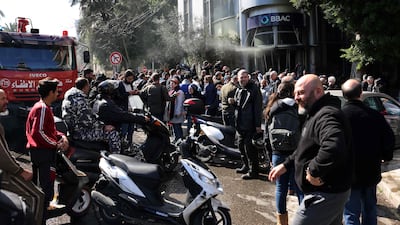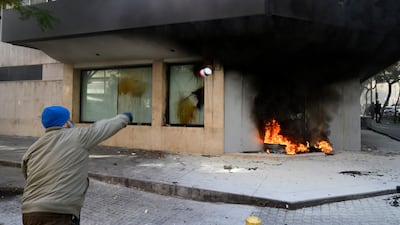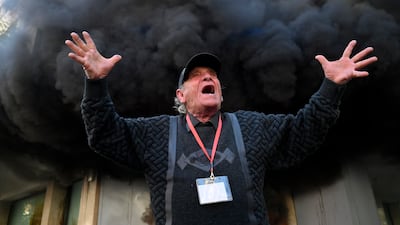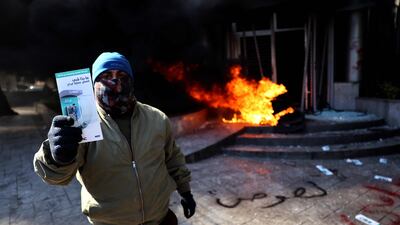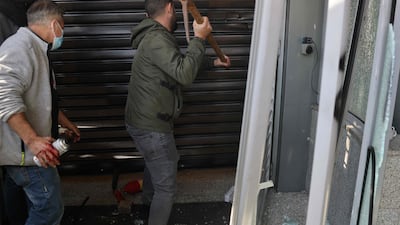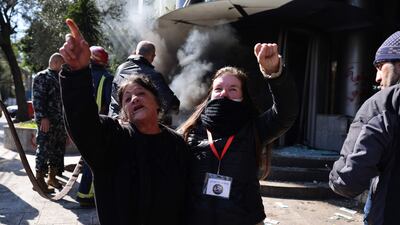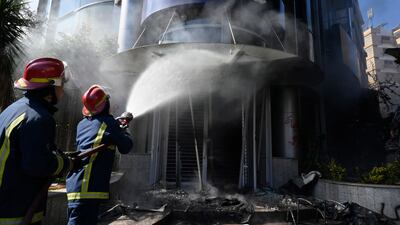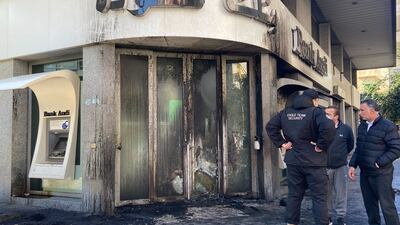Frustrated Lebanese protesters caused damage at banks in Beirut on Thursday as Lebanon’s commercial banking institutions marked the 10th day of their strike.
Protesters broke several windows and doors of at least five banks in the Badaro area of the city and set fire to tires outside.
After demonstrators dispersed, an intruder alarm rang endlessly from Badaro’s Fransabank branch as onlookers inspected the carnage.
An old woman stared at a burned ATM covered in petrol. She’d come in the hopes of withdrawing money.
“Don't worry,” a passerby interjected. “They hadn't filled it with money anyway. The open strike means they aren't filling the atms.”
Later, a handful set fire to objects outside the home - including the front gate - of Salim Sfeir, the chair of the Association of Banks in Lebanon.
Lebanese banks began their open-ended strike last week in protest at recent judicial actions. A court recently ruled in favour of a couple who had been involved in a dispute with Lebanon's Fransabank over their blocked deposits.
The Court of Cassation had ordered that the couple be paid cash, rather than a cheque — which would have been at a much lower value. The Association of Banks in Lebanon said they disagreed with this decision, and announced the strike soon after.
Banks have been accused of stalling efforts to open up their accounts to judicial investigators.
The protest was organised by depositor associations and protest groups.
“They’ve gone so far beyond any reasonable limits,” said Rami Ollaik, founder of United for Lebanon, referring to the banks and their actions. United for Lebanon is a collective of lawyers seeking to fight corruption and protect depositors' rights.
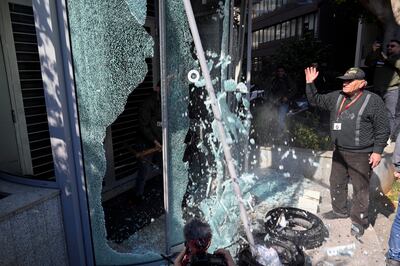
He warned that unless recent judicial decisions were implemented, the group was ready to go back to article 184 of the penal code, which according to United for Lebanon allows the use of force and the committing of an offence in defence of oneself or one's money.
“This is a demonstration of force and an act of defiance,” Mr Ollaik told The National, adding there would be “no tolerance for ripping us off further without complying to court decisions”.
Near a couple of banks that had been attacked, residents of Badaro lunched peacefully. Life in Lebanon has become punctured by popular displays of anger as living conditions deteriorate rapidly along with the economy.
The lunch crowd empathises, “but it's futile. It's just blowing off steam. What will it change?” a man asked. He had left his table at the cafe to inspect the damage to the next door bank’s facade.
“The only solution I see, short of throwing this whole political class into dumpsters, is emigration. I've lost hope in Lebanon.”
Lebanon has been entrenched in crippling economic crisis since 2019, which has been blamed on decades worth of corruption and mismanagement by the country's ruling elite - including its banks.
The pound has lost more than 98 per cent of its value against the dollar since the start of the collapse. Mr Ollaik said Thursday's developments were “indirectly related” to the severe deprecation of the local currency on the parallel market.
On Thursday, it was trading at more than 80,000 to the dollar, compared with 60,000 at the start of the month, according to websites monitoring the exchange rate.
The depreciation has meant a surge in fuel prices in a country where 80 per cent of the population now lives below the poverty line, according to the UN.

